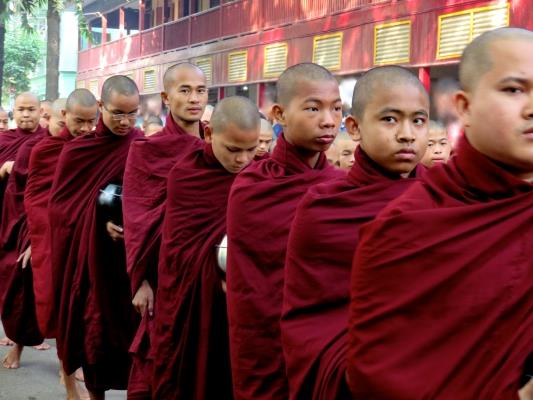
Hybridizing indigenous and Western concepts, contemporary Burmese nationalist ideology presents the Buddha as a patriot and conceptualizes the nation from a Buddhist framework, writes Niklas Foxeus (Stockholm University) in the journal Religion (October). Following clashes between Buddhists and Muslims in 2012, Buddhist nationalist and anti-Islamic movements, led by monks, appeared in Myanmar, and the unrestricted propagation of their views reached its high point between 2012 and 2015. Foxeus analyzes the sermons that these monks preached to huge audiences, as well as conducting interviews with leading monks and their followers. He finds that “Buddhist myths and legends are recast as national narratives,” with the Buddha himself presented as having been a devout nationalist. Buddhist leaders go so far as to claim that the Buddha had not been an Indian but looked Burmese. The Burmese people are presented as blood descendants of the Buddha’s clan, thus fusing Buddhism with an endogamous national identity. The idea of Buddhism as the source of Myanmar’s national identity had already been developed in the early twentieth century against British colonizers and Indian immigrants. According to Foxeus, resentment against the Indian immigrants, whom the British encouraged to come to Burma and who were thus perceived as part of the occupying forces, was turned into hostility against Muslims in the 1990s, with the same emphasis on threats to Burmese culture and fears of a foreign takeover.
Just as one should provide for one’s immediate family before the larger community, nationalist preachers stress the Buddhist principle of “working for the benefit of relatives” as practitioners’ first duty while interpreting “relatives” to mean the nation, arguing that first making the nation peaceful and safe then makes it possible to fulfill the higher duty of “working, without discrimination, for the benefit of all sentient beings in the world.” Muslims are perceived as wealthy and growing in number, thus endangering the survival of Buddhism. To defend it, a nationalist discipline is established, stating that one should only  marry someone of the same race and religion, that children should be taught about nation and religion, that one should only buy from people of the same nation and religion, and that only Buddhist leaders should be elected. Discriminatory practices come to be seen as legitimate “because they are recast as genuinely Buddhist practices that serve the aim of saving and protecting the Buddha’s dispensation.” Building on Buddhist imaginations and Western concepts of race and nation inherited from the colonial period, this Buddhist nationalism mobilizes laypeople and allows Buddhists to “acquire a sense of unity and purpose.”
marry someone of the same race and religion, that children should be taught about nation and religion, that one should only buy from people of the same nation and religion, and that only Buddhist leaders should be elected. Discriminatory practices come to be seen as legitimate “because they are recast as genuinely Buddhist practices that serve the aim of saving and protecting the Buddha’s dispensation.” Building on Buddhist imaginations and Western concepts of race and nation inherited from the colonial period, this Buddhist nationalism mobilizes laypeople and allows Buddhists to “acquire a sense of unity and purpose.”
(Religion, https://www.tandfonline.com/rrel/)